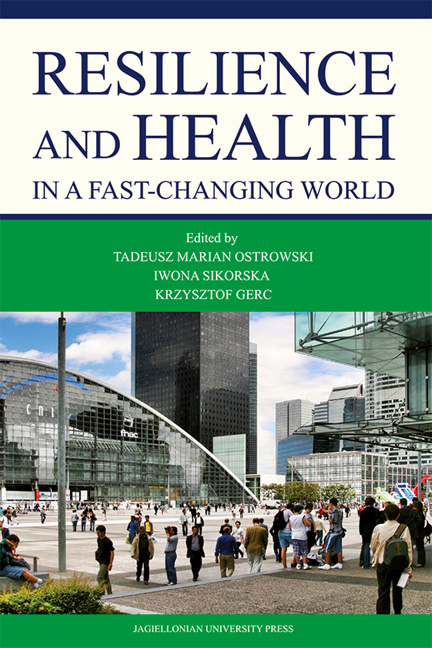Book contents
- Frontmatter
- Table of Contents
- Resilience from a Variety of Theoretical Perspectives: an Introduction
- I RESILIENCE IN THE PHILOSOPHICAL AND THE EXISTENTIAL CONTEXTS
- II SOCIAL CONTEXTS OF RESILIENCE
- Tough, Resistant, Hard: Resilience and Criminality
- Parentification and Psychological Resilience – the Example of Maturity Levels of Defense Mechanisms
- Science of Art in Prison
- III PROMOTING OF RESILIENCE AND ASSISTED RESILIENCE
- IV THREATS TO MENTAL HEALTH
- List of Authors
Parentification and Psychological Resilience – the Example of Maturity Levels of Defense Mechanisms
from II - SOCIAL CONTEXTS OF RESILIENCE
Published online by Cambridge University Press: 12 January 2018
- Frontmatter
- Table of Contents
- Resilience from a Variety of Theoretical Perspectives: an Introduction
- I RESILIENCE IN THE PHILOSOPHICAL AND THE EXISTENTIAL CONTEXTS
- II SOCIAL CONTEXTS OF RESILIENCE
- Tough, Resistant, Hard: Resilience and Criminality
- Parentification and Psychological Resilience – the Example of Maturity Levels of Defense Mechanisms
- Science of Art in Prison
- III PROMOTING OF RESILIENCE AND ASSISTED RESILIENCE
- IV THREATS TO MENTAL HEALTH
- List of Authors
Summary
Abstract
In this paper, we would like to discuss the phenomenon of parentification as a specific form of relation inside a family, a dysfunctional relation. The shortest definition of parentification states that it takes place when a child enters the role of a parent and takes responsibility for the living situation and emotional state of the rest of the family (Hooper, 2007). We think that burdening children with the overwhelming responsibility of taking care of their parents or siblings has negative consequences in their adult lives. One of such consequences is the influence on psychological resilience through creating a certain defense structure. Defense mechanisms have an important role in coping with stress or overcoming life crises. Thanks to mature defense mechanisms, it is possible to successfully fulfill the tasks ascribed to particular development stages, achieving high levels of self-actualization at every stage. After analyzing the phenomenon of parentification, we have observed that people who experienced parentification in their childhood are characterized by immature defense mechanisms in their adult lives, which makes them less resistant to stress and causes them not to cope with difficult situations very well. In this article, we would like to share our reflections on the defense systems of people experiencing parentification to various extents and scopes.
Key words: parentification, familly system, resilience, defense mechanisms
Definition of Parentification
In the subject literature, there are several definitions of parentification, or the so called “role inversion” in the family. Mahler and Rabinovich (1956), researchers on the subject, noticed that there appears an inversion of roles between children and parents; the child becomes the confidant or a mediator in parents’ conflicts. A great contribution to the understanding of family and processes occurring within it was brought by the systems theory, which also enabled to understand parentification better. From the system perspective, it can be said that parentification helps to maintain the balance within a family distorted by conflicts between spouses or by developmental deficits and emotional problems of one of them. Support given to one or both parents by the child can be perceived as a kind of triangulation. The tension between spouses creates a necessity to form an alliance between one of them and the child, the result of which is reducing the tension created in the family system.
Information
- Type
- Chapter
- Information
- Resilience and Health in a Fast-changing World , pp. 73 - 92Publisher: Jagiellonian University PressPrint publication year: 2015
